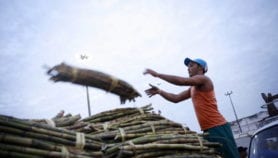By: Jia Hepeng
Send to a friend
The details you provide on this page will not be used to send unsolicited email, and will not be sold to a 3rd party. See privacy policy.
[BEIJING] Greenpeace China claimed yesterday (13 April) that genetically modified (GM) rice seed has been sold and grown illegally in central China’s Hubei province.
China’s Ministry of Agriculture says the claims need further investigation by authorised laboratories. It has asked authorities in Hubei province to send samples to Beijing for testing.
Growing and selling GM rice is strictly forbidden in China, but according to Greenpeace China, at least 950 to 1,200 tonnes of it entered the food chain after last year’s harvest.
“Among the 25 samples we collected in the local rice seed market, 19 samples have been confirmed to contain genetically modified DNA by Germany-based laboratory Genescan,” says Sze Pang Cheung, GM campaigner for Greenpeace China.
“Our interviews with seed providers and farmers indicate that GM rice seeds have been sold for the past two years,” Sze told SciDev.Net.
According to Sze, the rice has been modified to produce a toxin that kills insects feeding on it, and could have originated in a Chinese university.
Chinese researchers have developed and experimented with several GM rice varieties that are resistant to the country’s major rice pests and diseases. In addition, field trials of drought- and salt-tolerant varieties of GM rice have taken place.
Greenpeace China’s evidence could be inaccurate and biased, says Wu Changyin, an agricultural biotechnology researcher at the Huazhong Agricultural University in Hubei, a leading institute in GM rice research
Wu insists that the ban on the sale of GM rice seed has been respected.
He told SciDev.Net that he believes that insect resistant GM rice poses no threat to human health and that the government should approve its sale as soon as possible.
Last December, the Chinese government began the final evaluation that GM rice needs to pass before it can be commercialised.
Chinese officials say that during field trials GM rice was grown on no more than two hectares in Hubei Province.
Greenpeace China, however, says that the rice was also grown commercially last year on 127-160 hectares. It estimates that the area will increase to more than 1,000 hectares in 2005 unless action is taken.












